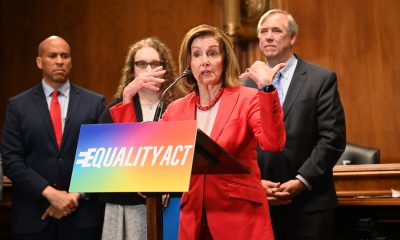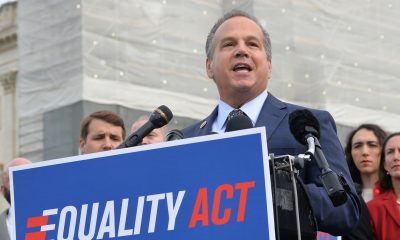National
Two gay candidates shine in fundraising
Pougnet, Cicilline post strong second-quarter results

Congressional candidate David Cicilline, the mayor of Providence, R.I., has raised $1.16 million over the course of his campaign. (Photo courtesy of Cicilline)
Two gay politicians posted strong second-quarter fundraising numbers that could propel them to seats in Congress.
Campaign finance reports made public earlier this month show Steve Pougnet, the mayor of Palm Springs, Calif., and David Cicilline, the mayor of Providence, R.I., boasting particularly strong numbers.
And Pougnet had the added accomplishment of keeping his fundraising numbers on par with his incumbent Republican opponent, Rep. Mary Bono Mack (R-Calif.). Both candidates raised about $400,000 for the April to June period.
The second-quarter numbers mean Pougnet has raised $1,267,910 so far in his campaign, leaving him with $878,283 in cash on hand, while Bono Mack raised $1,731,752, leaving her with $1,241,919 in cash on hand.
In a statement, Pougnet said he’s “incredibly humbled” by the support he’s received in his bid to represent California’s 45th congressional district.
“In these very difficult times, our congresswoman has been absent and it’s clear people are hungry for change,” Pougnet added.
But Ryan Mahoney, campaign manager for Bono Mack, touted the Republican candidate’s fundraising ability and noted that Bono Mack is “humbled” by the support she’s received.
“She is proud to represent the people of California’s 45th congressional district and will continue to fight on their behalf to end reckless spending and debt in Washington and create more jobs and better business opportunities in California,” Mahoney said.
Pougnet’s ability to match Bono Mack during the second quarter is unusual because challengers often do not match their incumbent opponents in fundraising. The fundraising numbers are also significant because the race in the 45th district is widely seen as among the most competitive congressional contests in the country.
The Democratic Congressional Campaign Committee put Pougnet on its “Red to Blue” program, and Bono Mack has been a lawmaker the National Republican Congressional Committee has worked to protect.
Notable donations to Pougnet from LGBT groups include $2,400 from the Gay & Lesbian Victory Fund and $6,900 from the Human Rights Campaign. Both organizations have endorsed the candidate. Donations also have come from Bruce Bastian, a Utah-based gay billionaire philanthropist, who donated $2,400; Hilary Rosen, a D.C. lesbian PR executive, who donated $1,000; and Lane Hudson, a D.C. gay activist, who contributed $300.
But Bono Mack is not without LGBT donors. In April, the Log Cabin Republicans gave $500 to her campaign.
Bono Mack had been considered a pro-LGBT Republican because of her votes in favor of the hate crimes bill and a version of the Employment Non-Discrimination Act, as well as votes against the Federal Marriage Amendment. Her record was tarnished in May when she voted against an amendment that would lead to repeal of “Don’t Ask, Don’t Tell.”
R. Clarke Cooper, Log Cabin’s national director, noted his organization made the $500 contribution prior to Bono Mack’s vote against “Don’t Ask, Don’t Tell” repeal.
He said although Bono Mack voted against the repeal amendment, she ultimately voted in favor of the fiscal year 2011 defense authorization bill as a whole. Consequently, Cooper said Log Cabin’s endorsement of the Republican lawmaker stands.
“[Log Cabin] will continue to work with Representative Bono Mack,” Cooper said. “Using the carrot approach, additional [Log Cabin] PAC funds could be made available contingent upon her future work and performance in the House.”
Cicilline, who’s running to succeed Rep. Patrick Kennedy (D-R.I.) to represent Rhode Island’s 1st congressional district, meanwhile raised $436,000 in the second quarter. He’s raised $1.16 million over the course of his campaign and ended the quarter with $901,000 in cash on hand.
In a statement provided by his campaign, Cicilline said he’s pleased with his fundraising and the LGBT support he received in the second quarter.
“I am extremely grateful to the members of our community who are supporting my campaign for Congress,” he said. “They are helping to ensure that we have the resources necessary to get our message out for the Sept. 14 primary.”
Bill Lynch, the former head of the Rhode Island Democratic Party who’s running against Cicilline in the primary, raised $55,832 in the second quarter. In the same period, he spent $126,000, leaving him with $139,000 in cash on hand.
The winner of the Democratic primary will likely face Republican John Loughlin, an Iraq war veteran and Rhode Island Assembly member. He raised $104,786 in the second quarter while spending $192,000. Loughlin has $101,000 in cash on hand.
Cicilline is running in a safely Democratic district and the Democratic nominee who wins the primary is widely expected to succeed Kennedy in the U.S. House.
The Providence mayor has been the beneficiary of LGBT support over the course of the campaign, particularly during the second quarter. The Gay & Lesbian Victory Fund, which has endorsed Cicilline, contributed $2,400 to his campaign in the second quarter.
Michael Cole, an HRC spokesperson, said his organization donated $721 to Cicilline in the second quarter, which was mostly in-kind contributions raised through HRC’s website.
Noting that HRC previously donated $6,025 to Cicilline, Cole said HRC plans to max out that contribution to $10,000 by year’s end.
Among the notable contributors to Cicilline’s campaign in the second quarter were Bastian, who donated $4,800; Rosen, who donated $500; Joe Solmonese, HRC’s president, who personally donated $500; and Winnie Stachelberg, senior vice president for external affairs at the Center for American Progress, who donated $1,000.
Other gay congressional candidates seeking office didn’t fare as well as Pougnet or Cicilline during the second quarter.
Ed Potosnak, a gay Democratic former staffer for Rep. Mike Honda (D-Calif.) and public school teacher running in New Jersey, raised $47,000 in the second quarter while spending $26,000.
His finances leave him with $72,000 in cash on hand. Potosnak has raised $148,000 over the course of his campaign. Potosnak’s GOP opponent in his race to represent New Jersey’s 7th congressional district, one-term incumbent Rep. Leonard Lance (R-N.J.), raised $108,000. However, he spent nearly $250,000 in the same period, leaving him with $359,000 in cash on hand.
In what could be an uphill battle for a U.S. House seat, Potosnak is running in a traditionally Republican district. He hasn’t been endorsed by HRC or the Victory Fund.
Despite the funding disparity, Potosnak said he’s happy with the amount he raised in the second quarter because it came from individuals donors and not special interest money.
“Compared to the opponent, the guy that I’m running against, Congressman Lance, I received more contribution from individuals in the last filing — about $5,000 more,” Potosnak said. “I didn’t get the special interest money from the big banks and Wall Street that are fueling his campaign.”
A similar situation with campaign finances is playing out in Florida’s 17th congressional district, where nine candidates, including North Miami City Council member Scott Galvin, are vying for the Democratic nomination in a primary set for Aug. 24.
After raising $57,000 in the second quarter while spending $97,000, Galvin had about $15,000 in cash on hand. He’s raised about $112,000 over the course of his campaign, according to FEC records.
Galvin said he’s feeling good about his finances for the second quarter and was preparing to submit an amended report showing that he has raised $130,000 over the course of his campaign.
“We found several pages of donations that didn’t get included by accident, so for what it’s worth, the to-date total, I guess, would show $130,000,” Galvin said.
The Gay & Lesbian Victory Fund, which has endorsed Galvin, contributed $2,400 to his campaign during the second quarter.
The candidate in the Democratic primary with the greatest war chest is Rudolph Moise, a physician and president of the Comprehensive Health Center in North Miami. He raised $938,162 for his campaign, although $800,000 was a personal loan to his campaign from himself. He spent $280,000 in the second quarter, leaving him with $909,000 in cash on hand.
Galvin said the disparity in finances didn’t bother him and he would remain focused on a “grassroots concentrated effort.”
“We’re doing it through all the old-fashioned, knocking-on-door, mail-to-the-home, traditional way of campaigning,” he said.
The 17th congressional district in Florida is also considered a safely Democratic seat. No Republican candidate has filed for candidacy, so the winner of the Democratic primary would be the presumptive winner of the seat.
State Department
HIV/AIDS activists protest at State Department, demand full PEPFAR funding restoration
Black coffins placed in front of Harry S. Truman Building

Dozens of HIV/AIDS activists on Thursday gathered in front of the State Department and demanded the Trump-Vance administration fully restore President’s Emergency Plan for AIDS Relief funding.
Housing Works CEO Charles King, Health GAP Executive Director Asia Russell, Human Rights Campaign Senior Public Policy Advocate Matthew Rose, and others placed 206 black Styrofoam coffins in front of the State Department before the protest began.
King said more than an estimated 100,000 people with HIV/AIDS will die this year if PEPFAR funding is not fully restored.
“If we continue to not provide the PEPFAR funding to people living in low-income countries who are living with HIV or at risk, we are going to see millions and millions of deaths as well as millions of new infections,” added King.
Then-President George W. Bush in 2003 signed legislation that created PEPFAR.
The Trump-Vance administration in January froze nearly all U.S. foreign aid spending for at least 90 days. Secretary of State Marco Rubio later issued a waiver that allows the President’s Emergency Plan for AIDS relief and other “life-saving humanitarian assistance” programs to continue to operate during the freeze.
The Washington Blade has previously reported PEPFAR-funded programs in Kenya and other African countries have been forced to suspend services and even shut down because of a lack of U.S. funding. Two South African organizations — OUT LGBT Well-being and Access Chapter 2 — that received PEPFAR funding through the U.S. Agency for International Development and the Centers for Disease Control and Prevention in recent weeks closed down HIV-prevention programs and other services to men who have sex with men.
Rubio last month said 83 percent of USAID contracts have been cancelled. He noted the State Department will administer those that remain in place “more effectively.”
“PEPFAR represents the best of us, the dignity of our country, of our people, of our shared humanity,” said Rose.
Russell described Rubio as “ignorant and incompetent” and said “he should be fired.”
“What secretary of state in 90 days could dismantle what the brilliance of AIDS activism created side-by-side with George W. Bush? What kind of fool could do that? I’ll tell you who, the boss who sits in the Harry S. Truman Building, Marco Rubio,” said Russell.

U.S. Military/Pentagon
Pentagon urged to reverse Naval Academy book ban
Hundreds of titles discussing race, gender, and sexuality pulled from library shelves

Lambda Legal and the Legal Defense Fund issued a letter on Tuesday urging U.S. Defense Secretary Pete Hegseth to reverse course on a policy that led to the removal of 381 books from the Nimitz Library of the U.S. Naval Academy in Annapolis, Md.
Pursuant to President Donald Trump’s executive order 14190, “Ending Radical Indoctrination in K-12 Schooling,” the institution screened 900 titles to identify works promoting “diversity, equity, and inclusion,” removing those that concerned or touched upon “topics pertaining to the experiences of people of color, especially Black people, and/or LGBTQ people,” according to a press release from the civil rights organizations.
These included “I Know Why the Caged Bird Sings” by Maya Angelou, “Stone Fruit” by Lee Lai, “The Hate U Give” by Angie Thomas, “Lies My Teacher Told Me: Everything Your American History Textbook Got Wrong” by James W. Loewen, “Gender Queer: A Memoir” by Maia Kobabe, and “Democracy in Black: How Race Still Enslaves the American Soul” by Eddie S. Glaude, Jr.
The groups further noted that “the collection retained other books with messages and themes that privilege certain races and religions over others, including ‘The Clansman: A Historical Romance of the Ku Klux Klan’ by Thomas Dixon, Jr., ‘Mein Kampf’ by Adolf Hitler, and ‘Heart of Darkness’ by Joseph Conrad.
In their letter, Lambda Legal and LDF argued the books must be returned to circulation to preserve the “constitutional rights” of cadets at the institution, warning of the “danger” that comes with “censoring materials based on viewpoints disfavored by the current administration.”
“Such censorship is especially dangerous in an educational setting, where critical inquiry, intellectual diversity, and exposure to a wide array of perspectives are necessary to educate future citizen-leaders,” Lambda Legal Chief Legal Officer Jennifer C. Pizer and LDF Director of Strategic Initiatives Jin Hee Lee said in the press release.
Federal Government
White House sues Maine for refusing to comply with trans athlete ban
Lawsuit follows months-long conflict over school sports in state

The Justice Department is suing the state of Maine for refusing to comply with President Donald Trump’s executive order banning transgender athletes from participating in school sports, U.S. Attorney General Pam Bondi announced on Wednesday.
DOJ’s lawsuit accuses the state of violating Title IX rules barring sex discrimination, arguing that girls and women are disadvantaged in sports and deprived of opportunities like scholarships when they must compete against natal males, an interpretation of the statute that reverses course from how the law was enforced under the Biden-Harris administration.
“We tried to get Maine to comply” before filing the complaint, Bondi said during a news conference. She added the department is asking the court to “have the titles return to the young women who rightfully won these sports” and may also retroactively pull federal funding to the state for refusing to comply with the ban in the past.
Earlier this year, the attorney general sent letters to Maine, California, and Minnesota warning the blue states that the department “does not tolerate state officials who ignore federal law.”
According to the Maine Principals’ Association, only two trans high school-aged girls are competing statewide this year. Conclusions from research on the athletic performance of trans athletes vis-a-vis their cisgender counterparts have been mixed.
Trump critics and LGBTQ advocates maintain that efforts to enforce the ban can facilitate invasive gender policing to settle questions about an individual athlete’s birth sex, which puts all girls and women at risk. Others believe determinations about eligibility should be made not by the federal government but by school districts, states, and athletics associations.
Bondi’s announcement marked the latest escalation of a months-long feud between Trump and Maine, which began in February when the state’s Democratic governor, Janet Mills, declined to say she would enforce the ban.
Also on Wednesday, U.S. Education Secretary Linda McMahon said the findings from her department’s Title IX investigation into Maine schools — which, likewise, concerned their inclusion of trans student-athletes in competitive sports — was referred to DOJ.
Earlier this month, the Justice Department pulled $1.5 million in grants for Maine’s Department of Corrections because a trans woman was placed in a women’s correctional facility in violation of a different anti-trans executive order, while the U.S. Department of Agriculture paused the disbursement of funds supporting education programs in the state over its failure to comply with Title IX rules.
A federal court last week ordered USDA to unfreeze the money in a ruling that prohibits the agency from “terminating, freezing, or otherwise interfering with the state’s access to federal funds based on alleged Title IX violations without following the process required by federal statute.”
-

 District of Columbia5 days ago
District of Columbia5 days agoFinal push to raise funds, fill D.C. hotels as WorldPride nears
-

 El Salvador3 days ago
El Salvador3 days agoGay Venezuelan makeup artist remains in El Salvador mega prison
-

 District of Columbia4 days ago
District of Columbia4 days agoReenactment of 1965 gay rights protest at White House set for April 17
-

 Maryland5 days ago
Maryland5 days agoFreeState Justice: Transgender activist ‘hijacked’ Moore’s Transgender Day of Visibility event












